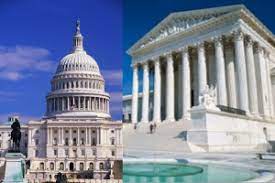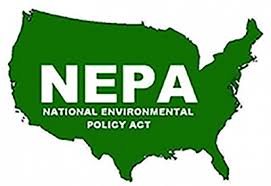Administrative Law
The Latest in the Mountain Valley Pipeline Case
The Supreme Court was right to overturn the lower court’s stay.
Environmental groups have fought valiantly to stop the construction of the MVP project, and the Fourth Circuit has repeatedly upheld their legal claims. Congress recently gave the pipeline the go-ahead. The Fourth Circuit quickly halted it again but was overturned earlier today by the Supreme Court. I’m no fan of natural gas pipelines or of …
Continue reading “The Latest in the Mountain Valley Pipeline Case”
CONTINUE READINGState Government Standing and Environmental Law
The Supreme Court seems to be cooling to the idea of empowering state AGs.
Massachusetts v. EPA, the cornerstone climate case, contains an extensive discussion of standing which opens by saying that lawsuits by state governments are entitled to “special solicitude.” In the last few weeks of its term, the Supreme Court opined repeatedly on state standing. “Special solicitude” seems to be on the wane. Overall, I that might …
Continue reading “State Government Standing and Environmental Law”
CONTINUE READINGDonald Trump vs. The MQD
Ironically, a conservative legal doctrine might block some of his excesses.
Trump hasn’t been at all secretive about plans for a possible second term. He has plans, big plans. So big, in fact, that they may collide with a conservative judicial rule called the Major Question Doctrine (MQD). Since the Court has mostly used the MQD to block initiatives by Democratic presidents, it would be more …
Continue reading “Donald Trump vs. The MQD”
CONTINUE READINGEPA and the Student Loan Decision
Will the major questions doctrine block EPA’s proposed rules?
Biden v. Nebraska, the student loan case, provided a new opportunity for the Court to apply the major question doctrine. Does this decision increase the threat that EPA’s proposed new regulations will be struck down under this doctrine? A careful reading of the majority opinion is at least somewhat reassuring. The Court painted a picture …
Continue reading “EPA and the Student Loan Decision”
CONTINUE READINGIndividuals Making a Difference
Two stories of the unknown environmental advocates behind major Supreme Court decisions.
My students often wonder whether they can actually make a difference. I like to tell them the story of Joe Mendelsohn. Mendelsohn, who worked at a tiny, obscure non-profit, decided that EPA needed to address climate change. His efforts, recounted in a book by Richard Lazarus, led to the Supreme Court’s blockbuster opinion in Massachusetts …
Continue reading “Individuals Making a Difference”
CONTINUE READINGThe NEPA Amendments in Nine Blog Posts
Surveying the legal problems of the biggest NEPA changes in the past fifty years.
On June 5, President Biden signed the debt ceiling bill, which provides the first significant rewrite of NEPA since it was passed over fifty years ago. In a series of blog posts, I’ve explored some of the legal issues raised by the amendments. My goal has been highlighting problem areas rather than providing anything like …
Continue reading “The NEPA Amendments in Nine Blog Posts”
CONTINUE READINGNEPA 2.0 and Transmission Projects
Will the new NEPA provisions speed approval of urgently needed projects?
In terms of the energy transition, the most important question about the recent NEPA amendments is whether they streamline permitting for transmission projects. The answer is complicated. We can divide transmission projects into two groups. The first group consists of transmission projects where federal involvement is limited to specific segments, such as stream crossings requiring …
Continue reading “NEPA 2.0 and Transmission Projects”
CONTINUE READINGHaving the Fox Guard the Henhouse?
Delegating Environmental Reviews to Project Sponsors
One of the most important provisions, of the new NEPA law, § 107(f), allows the lead agency to delegate preparation of environmental reviews to project applicants. There are unsettled questions about when this provision applies and how it interfaces with other parts of NEPA. There are clear conflicts of interest in assigning this role to …
Continue reading “Having the Fox Guard the Henhouse?”
CONTINUE READINGCentralizing Environmental Reviews under NEPA’s New Section 107
Sec. 107 is the key permitting reform applying to major projects. Will it work?
The 2023 Amendments to NEPA tweak current regulations in various ways in the name of permitting reform. Those changes make it easier to exempt smaller projects or cover them with programmatic impacts statements. The key issue, however, is going to be the effectiveness of new section 107, the main provision aimed at large-scale projects like …
Continue reading “Centralizing Environmental Reviews under NEPA’s New Section 107”
CONTINUE READINGCEQ and Permitting Reform
The enactment of NEPA 2.0 presents a golden opportunity for the agency.
In the recent debt ceiling law, Congress extensively revamped NEPA, the law governing environmental impact statements. An obscure White House agency, the Council on Environmental Quality (CEQ), will have the first opportunity to shape the interpretation of the new language. Much of the language in the new law is poorly drafted or vague, making CEQ’s …
Continue reading “CEQ and Permitting Reform”
CONTINUE READING









